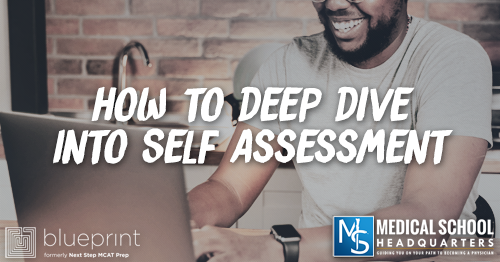Apple Podcasts | Google Podcasts
Session 297
We cover how to handle not getting the score you wanted in the Chem/Phys section of the MCAT. Joining us today is Alex from Blueprint MCAT. If you would like to follow along on YouTube, go to premed.tv.
Listen to this podcast episode with the player above, or keep reading for the highlights and takeaway points.
[02:23] Your Approach to Learning The Chem/Phys Section
Memorizing vs. Understanding
Chem/Phys is the first section of the day for people when they’re walking into their MCAT. And so, this could throw people off for the rest of the exam if they feel like they didn’t do as well as they wanted to.
“Many premeds approach studying for chemistry and physics, in undergraduate classes, in a very rote learning.”Click To TweetIn undergraduate classes, we’re so used to the idea that if we’re able to memorize things, we will also do well in class. That’s why many people don’t end up scoring well on the MCAT because the AAMC will almost never ask you a difficult Chem/Phys question that resembles precisely one that you’ve seen before. And it requires working with the concepts, rather than any kind of individual memorized approach.
Engaging vs. Note Taking
Alex’s advice is don’t take notes. Train 100% of your attention on the screen, and focus on understanding it. And you’ll know that you’ve understood it when you can anticipate what’s going to come next. Or you would know what it would be like if they were to change the scenario here. Once you notice your mental model of the concepts freely applied to different situations, you know that you’re on the right track.
[08:19] How Timing Goes for the Chem/Phys Section
Many people are particularly concerned with timing when it comes to math problems. For many, this is the toughest section to time-manage.
For anyone who wants to improve on timing, not just on this section, Alex says you need to see where your time is going. Are you spending too much time reading passages or working through math problems? Are you not spending too much time on the passage, but then you’re rereading it two or three times? Then try to figure out where time can easily be trimmed versus where it might be harder to gain.
'Insufficient review is probably the biggest mistake that people make on the MCAT.'Click To TweetTo get a sense of how long it takes to read the passage, look at the amount of time that it took you to “complete” a question, one of each passage. Have a stopwatch over on the side that you tap every time you complete a question.
[15:33] Techniques for the Chem/Phys Section
Start with the free resources.
Start with the easy ones. Khan Academy is great for content. Blueprint MCAT has a lot of free resources – Q-bank questions, flashcards, as well as a half-length diagnostic. Whatever you decide to use, start with the free resources and then progress to something conducive to your situation and your financial condition.
'As with all things premed, there is no correct path – only the best path for you.'Click To TweetMake use of flashcards.
Alex adds that flashcards are the treatment for a very specific diagnosis, which is if you need to retain something from an information perspective.
A good use of flashcards would be, for example, when you’re studying amino acid structures and the one-letter and three-letter codes. Most people understand amino acids and what they are. But the issue is if you can store it in your brain, which is not good at remembering things. Flashcards are therefore the perfect solution to that because they are memorization aids.
Other students also choose to make their own flashcards because it helps them memorize things better. And Alex argues that’s what the flashcards are for. For something more conceptual, like metabolism, Alex advises making a concept map to see how it all fits together.
[19:31] Finals Words of Wisdom
Alex says many students come to this section with a lot of pre-existing conceptions about how they are or are not good at physics and chemistry and math and all of that. Many people approach this test with the default mindset that it’s a skill they’re bad at.
With this loop of thought running in your mind, it pushes you away from doing the kind of practice that you need to do to improve. And with effective practice and careful review, you will improve at it too.
Links:
SEARCH SITE
SEARCH SITE
LISTEN FOR FREE












